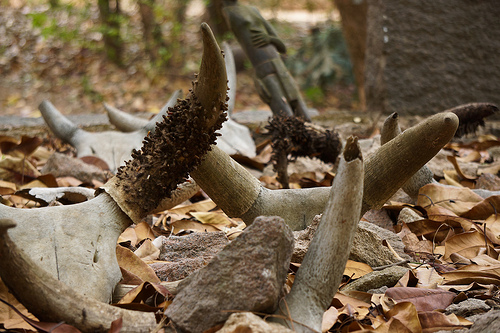Fady or the Ritual Prohibitions on the Island of Madagascar
Life for the Malagasy people is characterized by daily tasks and routines that repeat themselves. Daily life in the countryside usually consists of waking up, having breakfast, heading out early, working in the fields, returning home, eating while it is still light, and going to sleep. Far from new technologies, development, and the modern world, we see a balanced social relationship and harmony with our environment. This prevailing peace and order on the island of Madagascar is closely linked to the ritual prohibitions that have been passed down from ancestors for generations.
The country is deeply rooted in the lives of its inhabitants thanks to the omnipresence of Fady or ritual prohibitions. They regulate the lives of the Malagasy people, marking their daily tasks and dictating their behavior through a set of rules to avoid crossing the boundaries into drama. Over time, they also prove to be guides for the Malagasy.
The word Fady comes from the Malagasy language, the word “Pemali” meaning illegal or prohibited (the ancestors of the Malagasy people come from Indonesia). This meaning confirms the prohibition in the word Fady in the Malagasy language, but it can also simply be referred to as. also ein wichtiger Bestandteil der madagassischen Kultur und Traditionen. Es ist wichtig, diese Tabus zu respektieren, um negative Konsequenzen zu vermeiden. Manche Fady sind allgemein bekannt, während andere nur in bestimmten Regionen oder Familien gelten. Es ist ratsam, sich vor einem Besuch in Madagaskar über die örtlichen Tabus zu informieren, um Missverständnisse zu vermeiden. The observance of Fady, or taboos, is a common practice among all 18 Malagasy ethnic groups. Some Fady are specific to a particular community or ethnic group, and even to a particular individual or family. In Malagasy ancestor worship, the souls of ancestors play a crucial role in the lives of the Malagasy people, making this worship closely tied to the observances and requirements of the ancestors’ souls.
Ancestor worship also includes a variety of permanent and temporary Fady. The observance of Fady is not always permanent, as they can be temporary and even disappear based on the regulations of the village elders, diviners, and magicians. play an important role as authorities.
This diversity of Fady can be categorized into 4 categories:
Religious Fady or taboos through ancestor worship
In Malagasy culture, the souls of the deceased continue to exist after death, the soul is immortal. Death is therefore just a transition for further life in the afterlife. According to our beliefs, these souls still interfere in the existence of the living through their joy or dissatisfaction. sind einige Beispiele für Fady im Zusammenhang mit Bestattungsriten:
Es ist wichtig, die Fady zu respektieren, um Schande, Unheil oder sogar den Tod zu vermeiden. Die Madagassen glauben fest daran, dass die Seele des Verstorbenen nur dann in die Welt der Ahnen gelangen kann, wenn die entsprechenden Rituale eingehalten werden. Zornige Seelen werden gefürchtet, da sie bei den Lebenden Unheil anrichten können oder sogar zu weiteren Todesfällen in der Familie führen können.
Here are some examples of Fady in ancestor worship: Among the Sakalava tribes, the house of the deceased must be destroyed or burned. Burials in the morning, on Tuesday and Thursday, cause more deaths. A male uncut deceased person, as well as a female corpse without holes for earrings, cannot be buried in the family grave. There is always a need for purification by fire after a burial…
For amulets, such as bringers of success, good luck charms, or protection, fortune tellers and sorcerers command the owners to follow many Fady that are extremely important to observe under all circumstances. In this case, it is a matter of.
To break a Mifady is to violate the rules of abstinence. Ignoring or breaking a Mifady could lead to a curse, the ineffectiveness of amulets, or even death.
Some examples related to the use of amulets include: consuming pork, onions, or garlic.
Superior or Authority Fady
Superiority Fady refers to an individual’s position in Malagasy society, it’s simply about the hierarchy.
Therefore, it is important to know immediately where one belongs and to be able to adapt one’s behavior and manners to their surroundings.
The caste system reigns unconsciously in Malagasy thoughts, but especially in Malagasy society we still see nobles, free people, and slaves, even though the republic has replaced the kingdom. The goal is to grant privileges to everyone and to avoid any form of rudeness. The hierarchy applies not only in society but also in the family. The kings were the guardians on earth of the will of the ancestors.
Some examples of taboos related to superiors: For example, In and around the King’s Palace, there are no toilets because this place is considered sacred. Pigs are not allowed to be brought there or kept on the hill where the palace is located. An aristocrat is not allowed to carry a corpse, children are not allowed to build a house to the west of their parents’ house, only the patriarch is allowed to eat the hindquarters of poultry.
Everyday Taboos
By analyzing the two taboos mentioned above, we can understand the logic and significance of. Discovering and respecting Fady: honoring ancestors and superiors. However, Fady have become a part of everyday life for the Malagasy people and impact all social classes. Sometimes, we experience prohibitions without practical or understandable reasons. These Fady dictate relationships within the family, manners, posture, physical movements, habits, the use of a specific object, meals, and family relationships. Fady in daily life ensure health and survival in times of danger.
Some examples of daily actions that could have consequences include: Eating with a hat on = baldness. Adhering to certain Fady is believed to bring good health and protection in times of danger. Column leaning against the roof = lightning strike. Eating standing up = famine. Eating rice in the pot = famine. Using the key = crocodile attack. Wearing green clothing indoors = lightning strike. Catching flies = madness. Cutting the hair of a sick person = shortens life…
Taboos Concerning Animals and Plants in Madagascar
Madagascans are mostly farmers, livestock and agriculture are integral parts of their existence, making them subject to various taboos. The Zebu, an emblem…
In Malagasy culture, certain animals are considered sacred among some ethnic groups, leading to hundreds of specific Fady (taboos) related to these animals. Other domestic and wild animals have fewer Fady, except perhaps for pigs, which also carry many restrictions. In Malagasy culture and tradition, various animals and plants are considered Fady, such as prohibitions on killing or consuming certain animals or cutting down sacred trees. For example, Baobabs are believed to house the souls of ancestors, so the survival of certain plants and even entire forests is tied to these taboos or Fady.
For example: The fenced area where sacred trees grow must be entered barefoot, bringing pigs or even just having eaten pork before is strictly forbidden. Violating this rule can lead to illness or death. A Zebu herder must not eat hedgehogs, otherwise the calf will die. Striking a Zebu with a reed = the Zebu will get sick or be eaten by crocodiles. Buying a pig with the proceeds from selling Zebu = poverty. Holding a cat by the tail = the cat will eat the chicks. Going into the rice fields on Tuesday morning = the birds will come to eat the rice grains. The owner The rice transplantation begins from the rice fields, otherwise the rice fields will be pledged…
Author: Hasina Rafidison




